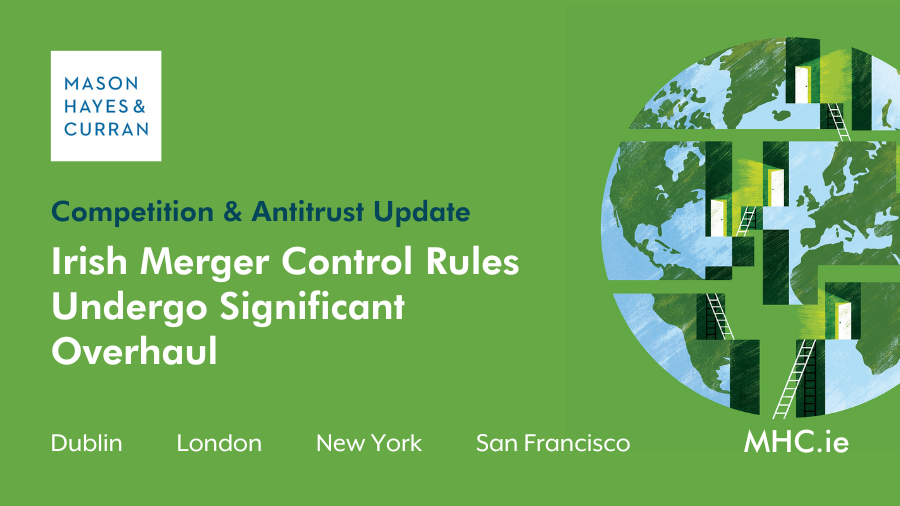Irish Merger Control Rules Undergo Significant Overhaul

Ireland’s competition laws have been significantly overhauled through the recent commencement of the Competition (Amendment) Act 2022.
The 2022 Act makes significant changes to the competition law landscape in Ireland. In particular, the changes close several gaps in Ireland’s merger control rules.
CCPC gets significant new merger control powers
The 2022 Act gives the Competition and Consumer Protection Commission (CCPC) the power to:
- Require notification of a “below-threshold” merger if it thinks the transaction “may, in the opinion of the Commission, have an effect on competition in markets for goods or services in the State”
- Impose mandatory requirements for information (RFIs) on third parties
- Impose interim measures, where it considers appropriate due to the risk that the merger may have an effect on competition in the State, and
- Unwind or dissolve a completed transaction, which the CCPC has found, following a review, substantially lessens competition in the State.
The 2022 Act also creates a new gun-jumping offence of closing a notified transaction prior to the CCPC issuing a clearance determination. Previously, the criminal offence of gun-jumping was limited to failing to notify a transaction, but did not extend to the implementation, or partial implementation, of a notified transaction prior to CCPC clearance.
Higher stakes for below-threshold transactions
The CCPC now, for the first time, has the power to require notification of transactions that do not meet the statutory turnover thresholds. The 2022 Act sets a low bar for the CCPC to exercise this new power, i.e., where, in the CCPC’s opinion, the transaction may have an effect on competition in the State. This standard affords the CCPC broad discretion so it is hoped that it will exercise its powers proportionately by focusing primarily on transactions with a significant Irish element and that give rise to serious concerns. However, without further guidance, it remains to be seen what types of transactions the CCPC will ‘call in’.
Once the CCPC calls in a below-threshold transaction, it may, where it considers appropriate, impose a non-exhaustive list of interim measures on the parties. Compliance with these measures could be extremely onerous, as tends to be the experience in the UK. In addition, a failure to comply with interim measures is a criminal offence, punishable by fines, and may constitute
gun-jumping, which could prompt a criminal investigation resulting in further fines.
In addition, if the CCPC ultimately finds a “substantial lessening of competition”, it may order the parties to unwind or dissolve the transaction, or
to take other measures to restore the status quo.
In short, the 2022 Act significantly increases the stakes for below threshold transactions which may have an effect on competition in the State.
Changes seek to align the CCPC with its counterparts
The changes under the 2022 Act, although far-reaching in the Irish context, in effect more closely align the CCPC’s powers with those of its counterparts, including the UK’s Competition and Markets Authority (CMA), and the European Commission.
Indeed, in the UK, it is customary for merging parties to consider whether to submit a voluntary notification or potentially face the prospect of the CMA exercising its broad discretion under the share of supply test to later review the transaction. Similar considerations now also apply in the EU since the European Commission’s decision in Illumina/Grail to use the Article 22 EUMR referrals mechanism to review transactions that are not mandatorily
notifiable at the EU or Member State levels.
Implications for our clients
To date, voluntary notifications have been the exception rather than the norm in Ireland. This is expected to change.
In light of the CCPC’s broad new powers to ‘call-in’ below-threshold transactions, merging parties with activities in Ireland now need to routinely
consider whether to notify the CCPC, even if the turnover thresholds for a mandatory merger notification are not met.
This process may significantly add to the deal timeline, especially if a voluntary notification is made. It is anticipated that voluntary notifications, by their very nature, will often result in a protracted review by the CCPC. Therefore, early and constructive engagement with specialist competition lawyers in Ireland is recommended.
For more information on the impact which the 2022 Act could have on future transactions, and more broadly, contact a member of our Competition & Antitrust team.
The content of this article is provided for information purposes only and does not constitute legal or other advice.
Share this:





